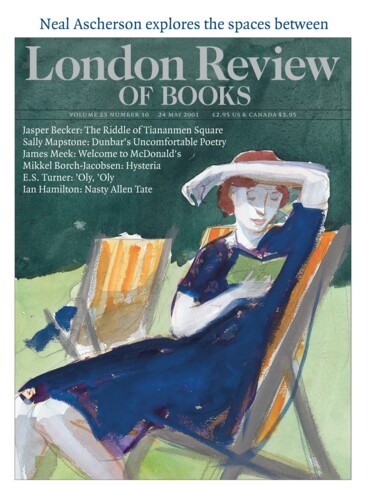With Yeoman Hague’s election pledge to ‘keep Britain independent’ and ‘give us back our country’ still echoing around the LRB office, a press release arrives on the Short Cuts desk from those brave crusaders against all things metric, the British Weights and Measures Association. There is apparently to be an appeal against the recent ruling that it is illegal to sell fresh food in imperial measures – good news for ‘Metric Martyr’ Steve Thoburn, the Sunderland market stall trader fined for selling his bananas in pounds and ounces. ‘I wake up at night in a panic,’ Thoburn has said, ‘and try and work out how my mates and I could find ourselves persecuted for selling fruit and veg.’
The BWMA, which avowedly has no opinion on any matter other than the need ‘to save pounds and ounces, the pint and mile’, and particularly not on ‘Britain’s membership of the European Union’, nevertheless has been heard to say that the metric system is ‘a political philosophy and tool’. Its press officer couldn’t deny the whiff of contradiction here, but he did point out helpfully that the Association ‘works closely’ with the UK Independence Party. Mmm.
But this weighs in at almost nothing on the Short Cuts scales of scandal (imperially calibrated, naturally) compared to the discovery that the list of the BWMA’s honorary members – there’s Jilly Cooper, Peter Hitchens, Norris McWhirter, mad Patrick Moore – includes the name of the universally adored J.K. Rowling OBE. Is this not taking the antique Englishness of Harry Potter just a little too far? But then I remember that the ‘feasts’ served up at Hogwarts boarding school are of ‘roast beef, roast chicken . . . lamb chops . . . Yorkshire puddings . . . peppermint humbugs’ and the like. All of which is, as the Daily Mail has said of Steve Thoburn, simply ‘patriotic and sensible’.
Reclaiming the flag has always been one of Tony Blair’s priorities for New Labour – ‘This is the patriotic party; because it is the people’s party’ – and towards the end of last year, having been accused of breaking up Britain and selling out to Brussels, he decided to appoint a ‘patriotism envoy’. This is an informal role; when asked in the Lords about the responsibilities of the ‘Minister for Patriotism’, Baroness Jay replied: ‘There is no Minister for Patriotism.’ Michael Wills MP has merely been asked to ‘help generate a proper discussion about what being British means in 2001’.
Whenever ‘Britishness’, ‘Englishness’ or any other ‘ness’ is to be summed up, you can be sure the clichés will come jogging along close behind. Sure enough, Wills talks of ‘a sense of fair play’, ‘tolerance’ and ‘decency’. He also picks out the NHS, the BBC and the Armed Forces as things which sum up what makes him proud to be British. All state-funded institutions, of course. Shame, then, that it was Wills who wrote Gordon Brown’s keynote speech in which he promised not to put up income tax during Labour’s first term – a policy the party now hopes to continue for a second. R.I.P. progressive taxation.
When, on the other hand, John Major thinks of Englishness, he thinks of cricket: ‘Fifty years on from now, Britain will still be the country of long shadows on county grounds, warm beer, invincible green suburbs, dog lovers’ etc etc. These are probably Major’s most famous words; no matter that Orwell lurks behind them, gagging on his ploughman’s lunch. Their melancholia, though perhaps not their complaceny, is well suited to David Frith’s entertaining and moving new book Silence of the Heart: Cricket Suicides (Mainstream, £14.99). Why is it, Frith asks, that more cricketers top themselves than any other sportsmen?
The cases are legion. Take the legendary A.E. Stoddart, the finest amateur batsman of the late 19th century, who, on one memorable afternoon, made 485 for Hampstead after staying up all night playing poker. Faced with money worries after his retirement from the game, he shot himself. Or Stoddart’s contemporary Arthur Shrewsbury, the best of the professionals. He was a terrible hypochondriac, who would write in letters: ‘Am pleased to say my health, as far as I know, is all right.’ In 1902, aged 46, he began to feel a pain in his kidneys; doctors reassured him but he was convinced of the worst. So one evening he asked his companion, Gertrude, to make him some cocoa and retired to his bedroom with a revolver. Soon she heard a loud noise upstairs – Shrewsbury had shot himself in the chest. ‘What’s the matter?’ Gertrude called up. ‘Nothing,’ he replied.
So why are there so many cricket suicides? In his conclusion, Frith points to the loss of camaraderie following retirement, and the ‘prolonged periods of boredom interspersed with acute tension’ which take their toll on any player of the game. No one really knows . . . to be discussed further in the pavilion, over a half-litre of warm beer.
Send Letters To:
The Editor
London Review of Books,
28 Little Russell Street
London, WC1A 2HN
letters@lrb.co.uk
Please include name, address, and a telephone number.

